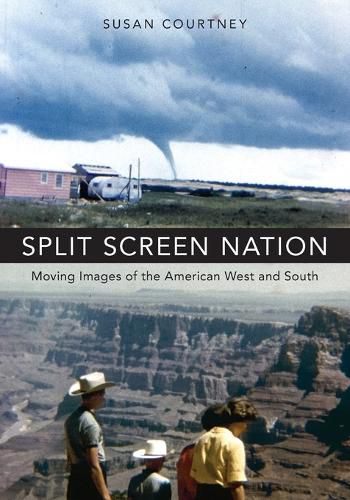Readings Newsletter
Become a Readings Member to make your shopping experience even easier.
Sign in or sign up for free!
You’re not far away from qualifying for FREE standard shipping within Australia
You’ve qualified for FREE standard shipping within Australia
The cart is loading…






Split Screen Nation traces an oppositional dynamic between the screen West and the screen South that was unstable and dramatically shifting in the decades after WWII, and has marked popular ways of imagining the U.S. ever since. If this dynamic became vivid in Quentin Tarantino’s Django Unchained (2012), itself arguably a belated response to Easy Rider (1969), this book helps us understand those films, and much more, through an eclectic history of U.S. screen media from the postwar era. It deftly analyzes not only Hollywood films and television, but also educational and corporate films, amateur films (aka home movies ), and military and civil defense films featuring tests of the atomic bomb in the desert. Attentive to sometimes profoundly different contexts of production and consumption shaping its varied examples, Split Screen Nation argues that in the face of the Cold War and the civil rights struggle an implicit, sometimes explicit, opposition between the screen West and the screen South nonetheless mediated the nation’s most paradoxical narratives–namely, land of the free /land of slavery, conquest, and segregation. Whereas confronting such contradictions head-on could capsize cohesive conceptions of the U.S., by now familiar screen forms of the West and the South split them apart to offer convenient, discrete, and consequential imaginary places upon which to collectively project avowed aspirations and dump troubling forms of national waste. Pinpointing some of the most severe yet understudied postwar trends fueling this dynamic–including non-theatrical film road trips, feature films adapted from Tennessee Williams, and atomic test films–and mining their potential for more complex ways of thinking and feeling the nation, Split Screen Nation considers how the vernacular screen forms at issue have helped shape how we imagine not only America’s past, but also the limits and possibilities of its present and future.
$9.00 standard shipping within Australia
FREE standard shipping within Australia for orders over $100.00
Express & International shipping calculated at checkout
Split Screen Nation traces an oppositional dynamic between the screen West and the screen South that was unstable and dramatically shifting in the decades after WWII, and has marked popular ways of imagining the U.S. ever since. If this dynamic became vivid in Quentin Tarantino’s Django Unchained (2012), itself arguably a belated response to Easy Rider (1969), this book helps us understand those films, and much more, through an eclectic history of U.S. screen media from the postwar era. It deftly analyzes not only Hollywood films and television, but also educational and corporate films, amateur films (aka home movies ), and military and civil defense films featuring tests of the atomic bomb in the desert. Attentive to sometimes profoundly different contexts of production and consumption shaping its varied examples, Split Screen Nation argues that in the face of the Cold War and the civil rights struggle an implicit, sometimes explicit, opposition between the screen West and the screen South nonetheless mediated the nation’s most paradoxical narratives–namely, land of the free /land of slavery, conquest, and segregation. Whereas confronting such contradictions head-on could capsize cohesive conceptions of the U.S., by now familiar screen forms of the West and the South split them apart to offer convenient, discrete, and consequential imaginary places upon which to collectively project avowed aspirations and dump troubling forms of national waste. Pinpointing some of the most severe yet understudied postwar trends fueling this dynamic–including non-theatrical film road trips, feature films adapted from Tennessee Williams, and atomic test films–and mining their potential for more complex ways of thinking and feeling the nation, Split Screen Nation considers how the vernacular screen forms at issue have helped shape how we imagine not only America’s past, but also the limits and possibilities of its present and future.